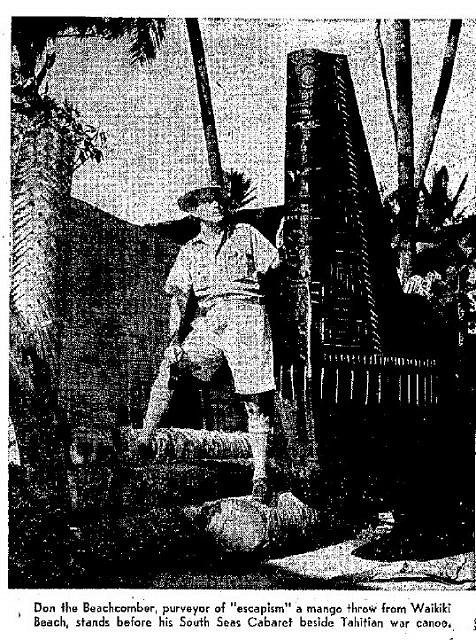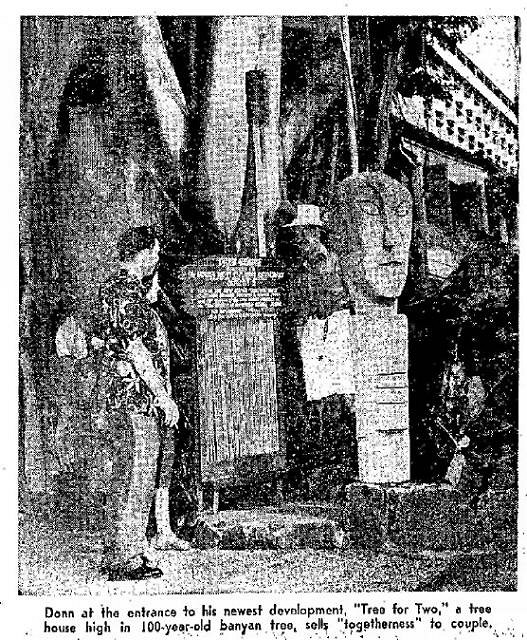P

Joined: Jul 07, 2005
Posts: 1564
|
P

Another story I dug up during a recent, fruitless research project.
(from the Long Beach Independent Press Telegram 24 January 1960)


Don the Beachcomber outranks 'em all as a...
South Seas Escape Artist
By Tom Streissguth
AT A BUSINESS luncheon in Hono-
lulu recently, a Mainland executive
reported "escape has gone legitimate."
"The headlong pace in America
makes 'escape' a necessity," he said.
"The desire to roam the sands of
some far-off desert isle no longer is
something to be filed and forgotten.
'Escape' is now in fashion. And it's
out in the open."
It is not reported as to whether
or not the "news" made Donn E. R. G.
Beach happy. No doubt the man who
is probably the most successful
"escape artist" in the Western world
merely returned to his cabaret-restaurant-
bar-coffee house, checked the
weekly food order and went off for
a swim at Waikiki—a mango's throw
away.
For Donn Beach is Don (himself)
the Beachcomber, self-styled host to
"prince, pirate, diplomat and beachcomber";
gourmet, world traveler, actor,
artist and headmaster of the most
successful Polynesian playground this
side of Pago Pago.
There are probably at least as
many legends about Beach as there
are imitations of his tropical tuckaways
(159 at last count). Facts he
will share; "legends find their own
way home."
HE WAS BORN "fifty-odd" years
ago in New Orleans, left home at an
early age to see the West "and enlarge
my limited horizon." Headquartering
in Los Angeles, he began
roaming the middle and South Pacific,
took bit parts in movies to keep
eating—"a habit I still cling to."
Gradually he built a collection of
Polynesiana: tribal ritual masks from
Fiji and Samoa, "tikis" (a sort of
stunted totem pole) from Hawaii and
Tahiti, carvings and lamps from Raratonga,
spears and shields from the
Marquesas and Raiatea.'
In addition, he tracked down authentic
recipes for food and drink, became
a student of rum because of its
popularity in the countries where
sugar cane is grown.
Hollywood friends were encouraging
and so "a few minutes after pro-
hibition was repealed," Donn Beach
opened the first "Don the Beachcomber."
It was a three-table operation
just off Hollywood Blvd. "But it could
seat 40 if you didn't mind sitting on
someone's shoulder," Beach recalls.
Movie people switched roles, became
his fans. Among-them: Marlene Dietrich,
Warner Baxter and Clark Gable.
Within five years Beach opened a sec-
ond branch in. Chicago, then a third
in Palm Springs.
WHEN WORLD WAR II came he
enlisted in the Air Force, followed on
the heels of invasion forces to set up
rest and rehabilitation centers. He
maintains a reserve lieutenant colonel
commission in the Air Force, spends
summer weeks checking out Pacific
club and mess facilities from Tokyo
to Taipei. He was recently awarded
a special citation for his efforts.
After the war, Beach decided on
Hawaii for good. He disposed of all
interests in the Mainland operations.
The first Hawaiian "Don's" opened
in 1946, near Waikiki Beach and in
the vicinity of his present layout in
the International Village.
Being much closer to the areas
from whence he had borrowed, the
Honolulu "Beachcomber" faced a
stricter test. A great many of his customers
"had been there and back."
But he passed the authenticity tests
with flying colors and kept a growing
staff busy with demands for 60-
plus rum-ventions of his own, including
such stoppers as "Missionary's
Downfall," "Vicious Virgin" and
"Shark's Tooth."
ONE DAY HE CAME UP with the
"Zombie," saw it become a national
"blockbuster." The Don the Beachcomber
Zombie remains one of his
most popular drinks and is listed in
his catalogue as: "Zombie—(Don will
not serve more than two to each person)—
$1.75."
The nine-month dock strike in
1949 brought about one of the more
important changes in the operation:
entertainment. With the right foods
increasingly hard to come by as the
strike wore on, Beach concentrated
on the bar business. But he wanted
to give his patrons more. He is at
least partly responsible for the success
of small Hawaiian musical and
singing groups as well as individual
singers. Arthur Lyman, whose "Quiet
Village" album has become a national
best-seller, got an early start at
Donn's club.
Don the Beachcomber continues
to grow; at present the operation includes
the South Seas Cabaret Restaurant
(seating more than 300)", Don
the Beachcomber Bar, The Colonel's
Plantation Steak House (you select
your own cuts, pay by the ounce)
and The Colonel's Coffee House (40
blends, 22 varieties from 13 countries).
He grows his own green baby
coconuts on his own plantation for
certain exotic specials (including the
Coconut Swizzle with Rum—$1.75),
has an interest in a tourist development
in Tahiti and owns an old
whalers' hotel on Maui, a beautiful
neighbor island.
OF SPECIAL INTEREST to Don
(himself) is the rise of the coffee
house. "The coffee house is coming
back into its, own," he says. "Metropolitan
London now boasts 213 of
them and another tea town, Sydney,
Australia, has 38 coffee houses in
King's Cross alone." Beach has the
only Italian espresso machine in Hawaii—
a monstrous contraption costing
close to $2,000 with "more valves
than the engine room of a submarine."
His Coffee House menu (50
cents) stars the machine as a featured
player: "The Caffee Espresso
(60 cents) is a strong brew of Venezuelan
Mountain Coffee given a dark
Italian,roast and brewed in the only
Caffee Espresso Machine in the' Hawaiian
Islands."
Whether the Mainland tourist Visits
the Coffee House or any other
Beach-head, one reality extends to
all: the rather high cost of exotica.
It will cost you 25 cents' extra to
have your cognac served in a brandy
warmer. A "Don the Beachcomber"
champagne, cocktail comes to $2.50
while a plain old lemonade,brings $l.
Beach's "reyenge" against any missionary
teetotalers present is to charge 60 cents
for .either tea, coffee or milk.
A Coca-Cola is 60 cents, too.
Leaving "no coconut unturned,"
Donn Beach has even gone into the
"togetherness" business with what he
calls "the most exclusive restaurant
in the world-—a tree house 75 feet
up in a 100-year-o1d banyan tree:
FOR $37.50 A COUPLE ("those
who are in love with love"),
Donn'-furnishes every thing
from fresh pikake leis to a
five-course dinner featuring
stuffed baby squab plus two
bottles of vintage champagne.
The couple receives two keys
for the two separate gates
(they throw one away after
coming back to earth), then
mount the curving treeway to
sit in the house high above
a courtyard of the International
Village. They can see
out the special blinds, but no
one can see in. There is a
telephone with an unlisted
number—calls can be made
to the outside world but none
can be received. There is a
television set in addition to
piped-in hi-fi music. Though
"A Tree for Two" is booked
months in advance, Beach
still reserves two nights a
week to entertain a roster of
sparkling guests from all corners
of the world.
At present, Don the Beachcomber
has plans for new
restaurants in Tokyo and
Hong Kong "some time in
1960." He will extend the
same invitation he has been
extending for 26 years—the
credo which is his "passport
to Paradise"
"Escape to the magic of
the, velvet Trade breeze
scented with jasmine, a taste
of the lotus, the first luscious
bite of the mango, the moonlit
beach touched by languid
waters of azure blue.
"Don's Hut is always open.
Come—sit and sip the Juice
of the Cane, for as Lord Byron
said . . . 'There's nought,
no doubt, so much the Spirit
calms as Rhum and True Religion'."
It is a difficult invitation
to turn down.
"I can't die until the government finds a safe place to bury my liver."
Phil Harris

|


